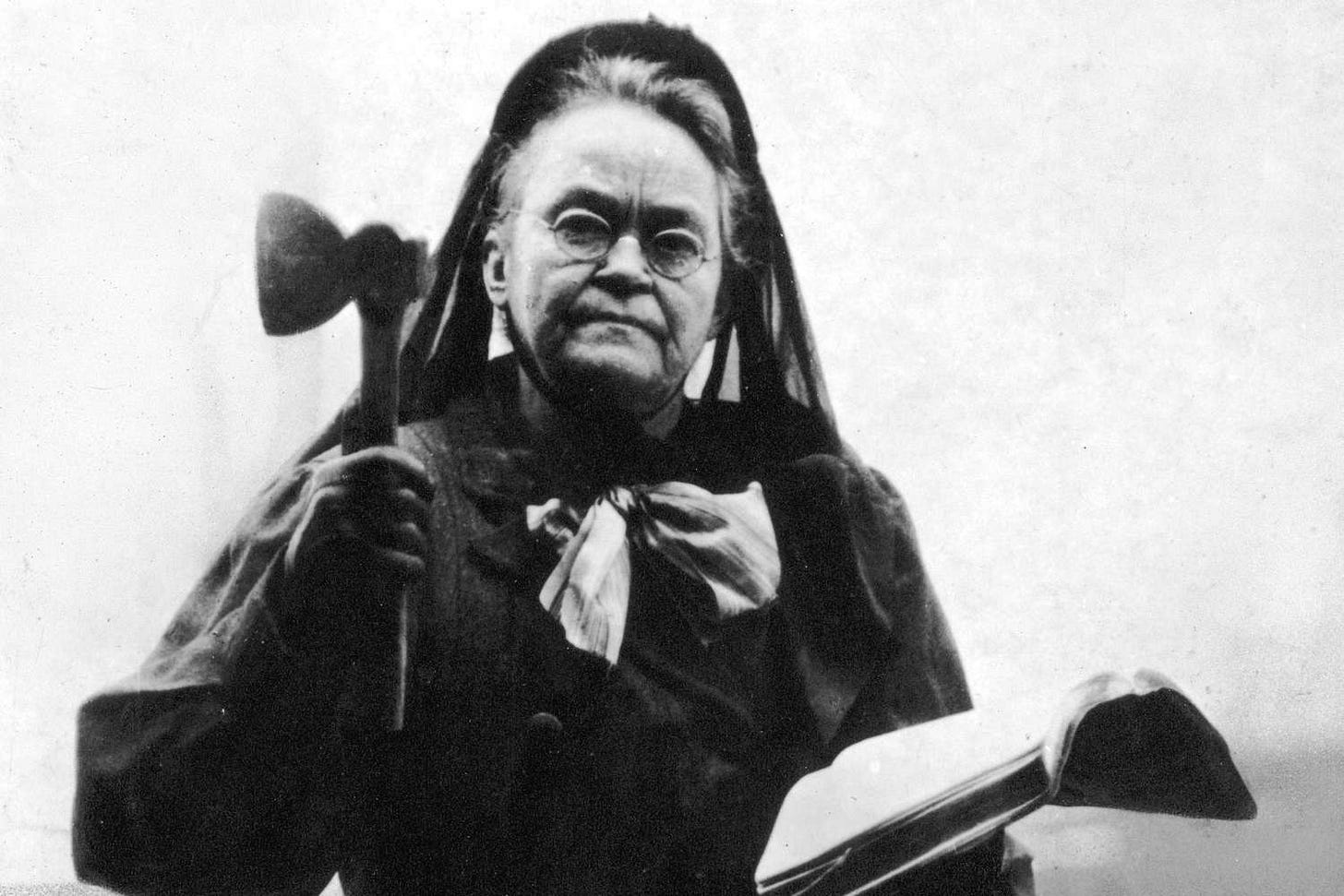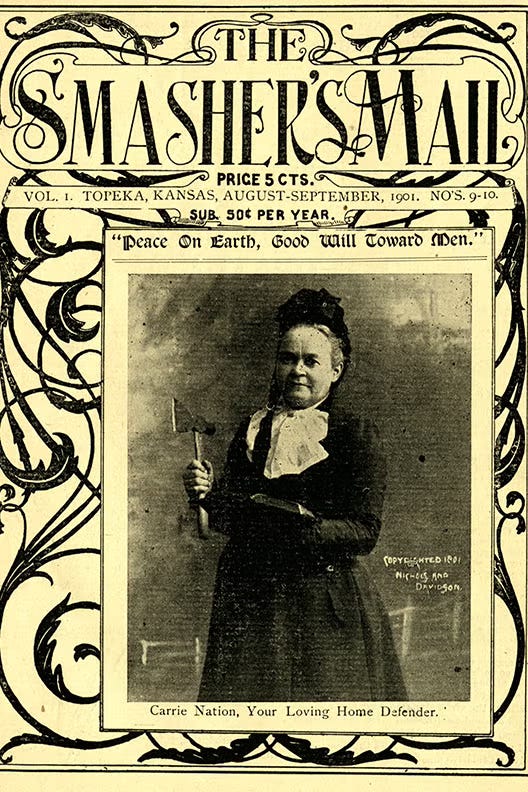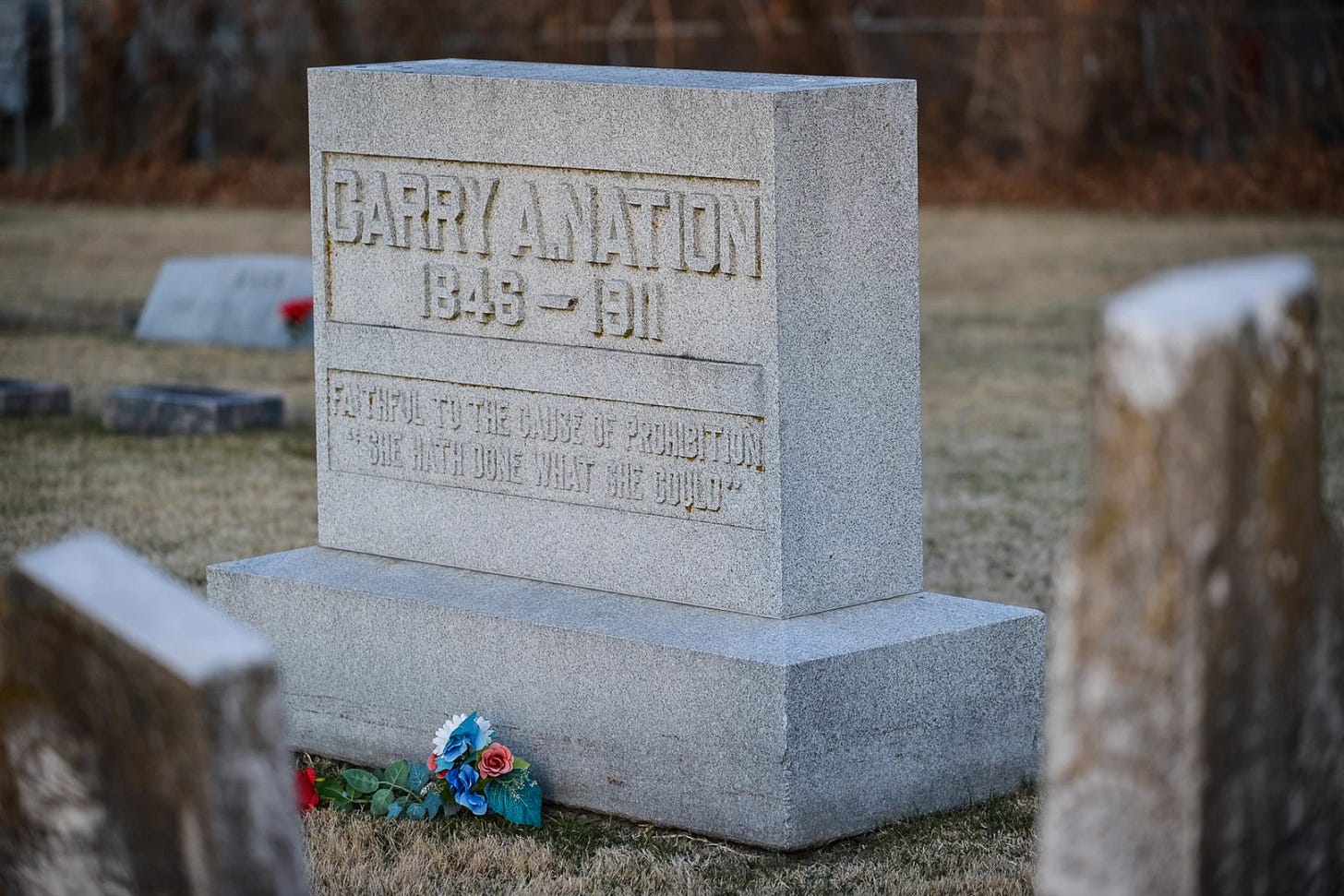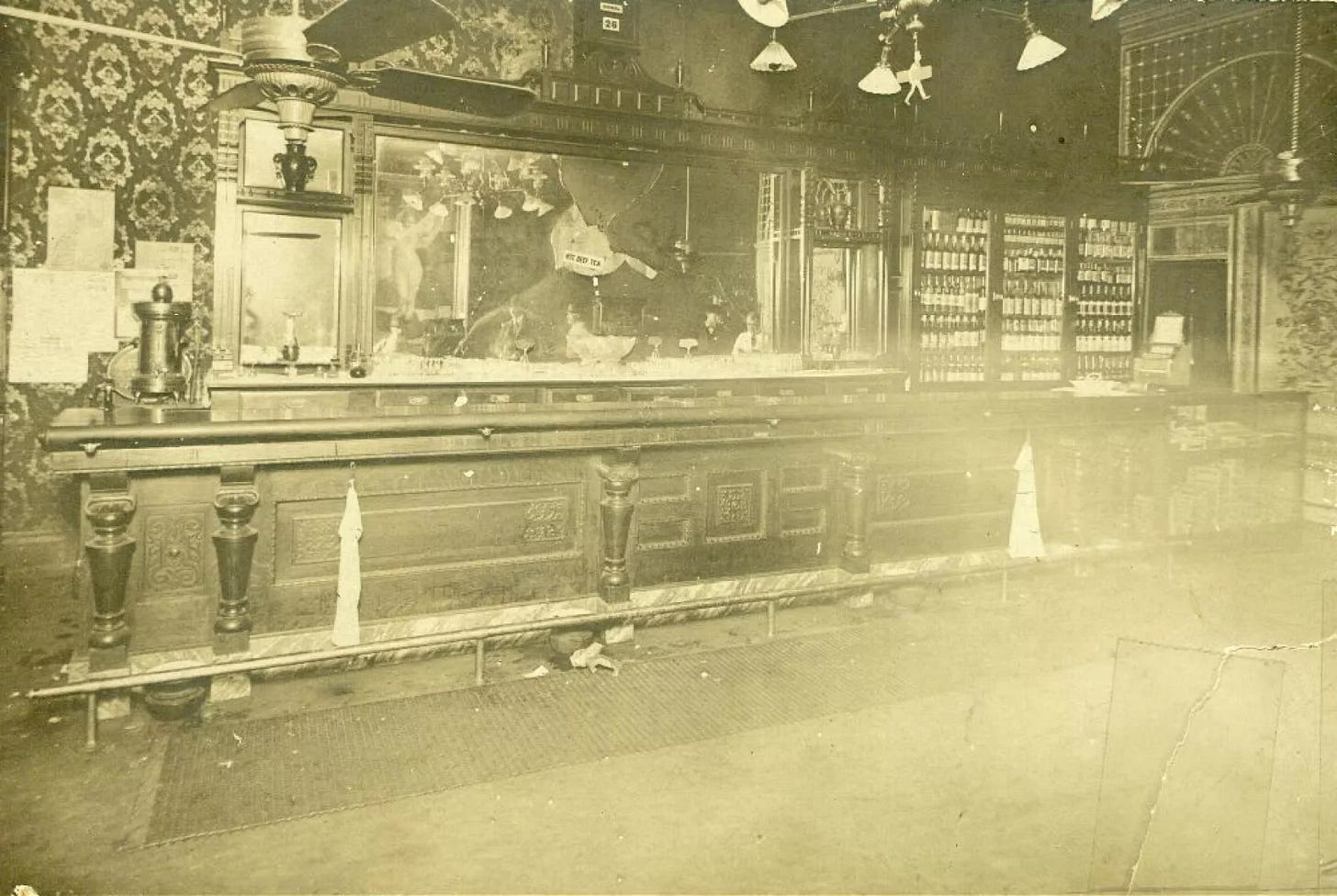Meet Firestarter Carry Nation,* the most famous activist to emerge from the American temperance movement due to her habit of attacking Kansas saloons with everything from cleavers to bricks to billiard balls. And thanks to the male biographers who have since attributed Nation’s tactics to menopause and mental illness, she’s also one of the most ridiculed activists in American history.
Nation’s activism started in antebellum Kentucky in the 1800s, where she grew up with a mentally ill mother. The slaves owned by Nation’s family owned cared for Carry in their quarters when her mother was incapacitated. Nation began attending subversive meetings about white tyranny and worshipped with slaves in secret. She also began to advocate publicly for slaves, demanding they be employed and housed before they were officially emancipated by the government.
It was that early activism that inspired Nation to become a prohibitionist and suffragist after she was widowed in her early 20s. Nation married a doctor and Union soldier who suffered from alcoholism and was just 29-years-old when he died from delirium tremens, leaving Nation and her daughter penniless. Nation began advocating for other women and widows who she viewed as victims of the alcohol companies and lobbyists who profited from their pain.

Nation married again a few years later — this time to a preacher — but her activism continued. She became known as “Mother Nation” for her charity work, including counseling prisoners, feeding and clothing the poor, and establishing homes to care for the wives and children of alcoholics (which served as an early model for modern-day women’s shelters). She also led the local branch of the Woman’s Christian Temperance Union, where she exhausted every nonviolent means of activism available to her at the time: pleading with tavern-keepers, writing letters, signing petitions, organizing temperance marches, and praying in front of illegal saloons.
Then, in 1900, Nation claimed a “heavenly vision” from God told her to destroy the liquor stock at Dobson’s Saloon in Kiowa, Kansas. Nation, who was almost 6-feet tall, showed up outside the saloon with rocks, yelling, “Men, I have come to save you from drunkard’s fate!” She carried out similar rampages at saloons throughout the state, causing her to be threatened by mobs of angry men, beaten by the wives of saloon owners, and arrested more than 30 times in less than a decade. To raise money to pay her legal fines and jail bonds, Nation, a master of self-promotion, began selling pins in the shape of a hatchet.
Eventually, even Nation’s sworn enemies acknowledged she had successfully compelled policymakers and police to enforce state prohibition laws. and she helped pass a new Kansas law further restricting the sale of alcohol and she made enough Missouri counties dry that the state was eventually declared dry. And she was an expert in getting her message out, even publishing a newspaper called “The Smasher’s Mail,” in which she advocated for prohibition and suffrage. Over and over again, Nation stood up to men in power, including testifying at the Kansas statehouse that she was forced to resort to destruction because women had no electoral power: “You wouldn’t give me the vote, so I had to use a rock!” she famously said

After her career in saloon smashing ended, Nation spent the rest of her life making speeches (she donated her profits to the Black Methodist Episcopal Church). After Nation filed for divorce from her second husband, she used her alimony to establish "The Home for Wives and Mothers of Drunkards" in Kansas City, Kansas. Nation also bought a small farm in Arkansas, which she intended to turn into a prohibition school to teach other women how to be activists, but she died before it opened. During a speech in 1911, Nation collapsed onstage — her last words were: "I have done what I could."
Nation died almost a full decade before the 18th Amendment was ratified, yet she is still the sole person blamed for the ill-fated passage of prohibition while the men actually responsible for prohibition are glorified. In fact, Frederick Douglass, William Jennings Bryan and Carry Nation all held the exact same positions on abolition, suffragism and prohibition. Douglass even once said, “If we could but make the world sober, we would have no slavery. Mankind has been drunk.” But the titles of their biographies belie a bias: Frederick Douglass: “Prophet of Freedom.” William Jennings Bryan: “A Godly Hero” and “Champion of Democracy.” And Carrie Nation? “Vessel of Wrath.”
Since Nation’s death, biographers and historians — mostly male — have attributed her activism and tactics to sexist tropes about women’s mental and physical health. In 1959, a biography claimed Nation was impacted by “glandular difficulties of the menopause that allowed suppressed forces to erupt violently.” And two of the most influential and widely read biographies about Nation also blamed her behavior on menopause, as well as “suppressed sexual desire” that was “perverted into an itching curiosity about vice, an aggressive prurience which found its outlet in violence, exhibitionism, and self-imposed martyrdom.”
These men also deemed Nation a religious kook for claiming to channel God, but Mark Lawrence Schrad, a historian and author of "Smashing the Liquor Machine: A Global History of Prohibition,” points out that President William McKinley claimed that God commanded him to make war on Spain, “but we don’t teach that the Spanish-American War was due to McKinley’s supposed insanity or menopausal hot flashes.”
It’s clear Nation’s reputation was perverted and promoted by men, and for more than a century, the public has accepted those misogynistic characterizations as fact. Because Nation’s rampages have inspired mockery, we may be missing a more poignant story about a disenfranchised woman who bravely demanded more from the leaders charged with protecting women. As Schrad notes, Nation was “a trailblazing social activist who was the embodiment of the feminist empowerment mantra that ‘well-behaved women seldom make history.’ Perhaps we should start recognizing her as such.’”

What’s a Firestarter? To me, it’s any woman creating a commotion by disrupting things and starting things. Women who are fearless in standing up for themselves or others. Women who are provocative and innovative. They harness their power to help others, and they seek out ways to encourage other women to stand up or speak out.
In the last decade, while leading Moms Demand Action, I began using the word “Firestarters” to describe the amazing women in the world who inspire me, and I think it’s a phrase we all should add to our vocabulary. Tell me about the Firestarters who inspire you in the comments and I’ll profile them in future posts.
*In 1903 Carrie Nation officially changed (and trademarked) her name to “Carry,” saying it meant “Carry A Nation for Prohibition.”





Thank you for sharing this; I had not known much about Carrie Nation's story beyond her work to prohibit the sales of alcohol. Your writing has turned her from a 1 dimensional person into someone vastly more real. And, as I've shared before, I believe misogyny is still deeply ingrained in society and causes many problems for all of us.
Wow! What a read. Fascinating. Also really brought out my own “glandular difficulties of the menopause" as I felt my fury rising at the labelling, the minimising, and the reclaiming of her work by men. So important that these stories are told. Unfortunately there is no shortage of content. Bring it on Shannon. Thanks Jo :-)